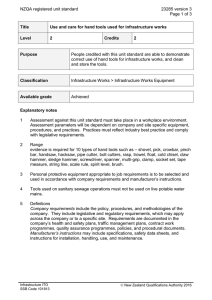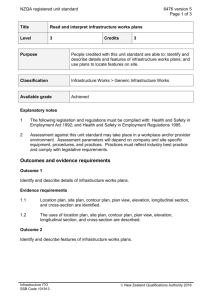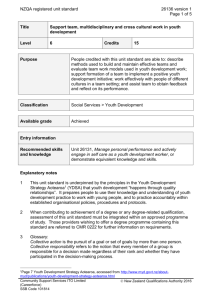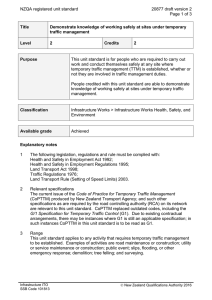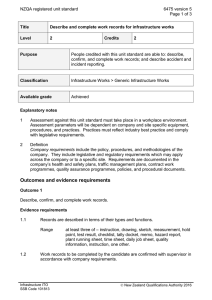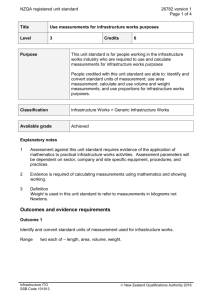NZQA registered unit standard 25872 version 2 Page 1 of 5
advertisement
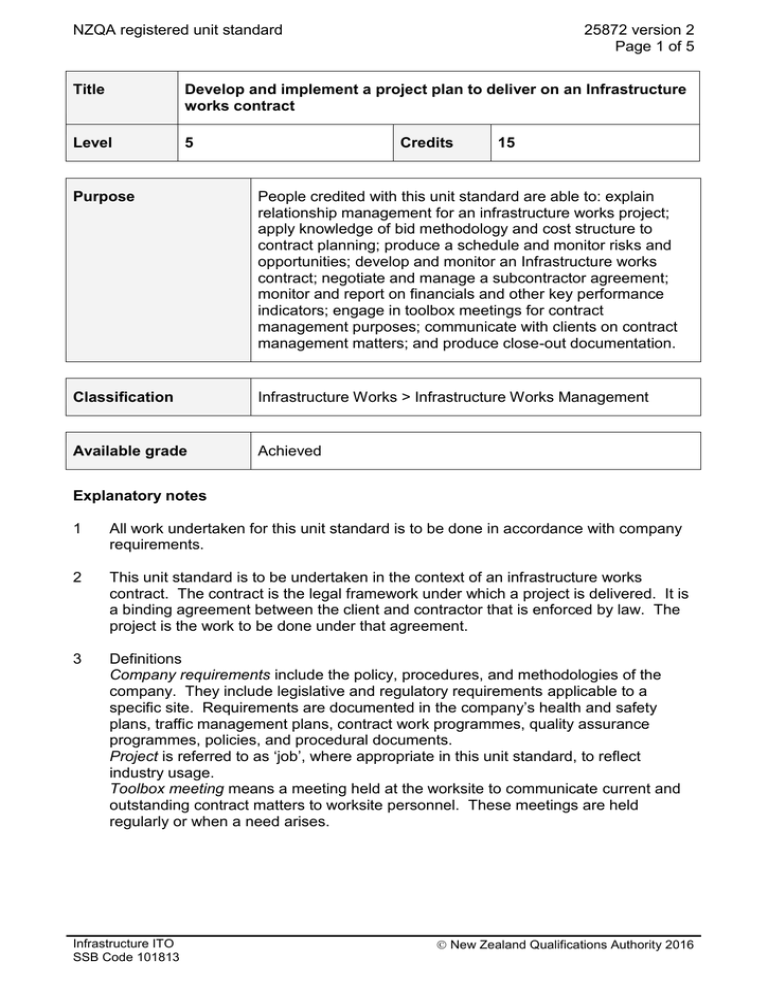
NZQA registered unit standard 25872 version 2 Page 1 of 5 Title Develop and implement a project plan to deliver on an Infrastructure works contract Level 5 Credits 15 Purpose People credited with this unit standard are able to: explain relationship management for an infrastructure works project; apply knowledge of bid methodology and cost structure to contract planning; produce a schedule and monitor risks and opportunities; develop and monitor an Infrastructure works contract; negotiate and manage a subcontractor agreement; monitor and report on financials and other key performance indicators; engage in toolbox meetings for contract management purposes; communicate with clients on contract management matters; and produce close-out documentation. Classification Infrastructure Works > Infrastructure Works Management Available grade Achieved Explanatory notes 1 All work undertaken for this unit standard is to be done in accordance with company requirements. 2 This unit standard is to be undertaken in the context of an infrastructure works contract. The contract is the legal framework under which a project is delivered. It is a binding agreement between the client and contractor that is enforced by law. The project is the work to be done under that agreement. 3 Definitions Company requirements include the policy, procedures, and methodologies of the company. They include legislative and regulatory requirements applicable to a specific site. Requirements are documented in the company’s health and safety plans, traffic management plans, contract work programmes, quality assurance programmes, policies, and procedural documents. Project is referred to as ‘job’, where appropriate in this unit standard, to reflect industry usage. Toolbox meeting means a meeting held at the worksite to communicate current and outstanding contract matters to worksite personnel. These meetings are held regularly or when a need arises. Infrastructure ITO SSB Code 101813 New Zealand Qualifications Authority 2016 NZQA registered unit standard 25872 version 2 Page 2 of 5 Outcomes and evidence requirements Outcome 1 Explain relationship management for an infrastructure works contract. Evidence requirements 1.1 Relationship management for infrastructure works contract management is explained in terms of understanding stakeholder expectations and consequences for the company. Range stakeholders – external including public, and internal; consequences may include but are not limited to – completion date or dates, quality and budget targets, management of onsite health and safety, crew morale. Outcome 2 Apply knowledge of bid methodology and cost structure to contract planning. Evidence requirements 2.1 Contract management documents are produced through the analysis of contract estimate items and the application of bid methodology to determine project requirements and item production rates. Range project requirements include but are not limited to – plant, labour, material, subcontract resources, budgets. Outcome 3 Produce a schedule and monitor risks and opportunities. Evidence requirements 3.1 Risk and opportunities schedule is produced. Range risk/opportunity identification, valuing, mitigation. 3.2 Monitoring of risk and opportunities, mitigation of risk, and development of opportunities is reflected in regular review and adjustment of the schedule. Outcome 4 Develop and monitor an Infrastructure works contract. Infrastructure ITO SSB Code 101813 New Zealand Qualifications Authority 2016 NZQA registered unit standard 25872 version 2 Page 3 of 5 Evidence requirements 4.1 Contract is diagrammatically represented. Range 4.2 may include but is not limited to – start time, activities of the job, duration of activities, sequence of activities, interrelationship of activities, milestones, finish time; representation may include – bar chart, flow chart, critical path chart, Gantt chart. Monitoring of contract is reflected in regular reviews and updating documentation. Outcome 5 Negotiate and manage a subcontractor agreement. Evidence requirements 5.1 Subcontractor agreement and its terms are understood and can be justified in regard to the organisation’s position as a contracting party. Range components of signed agreement may include but are not limited to – legal names of parties; any special conditions that apply such as start date, completion date, liquidated damages, bonds, insurances; health and safety declaration; scope of the work, which may include but is not limited to – schedule of rates, drawings, specifications. 5.2 Subcontractor agreement is submitted to contracting parties in advance of meeting in time for parties to give considered response to document. 5.3 Negotiation meeting is conducted on a win-win basis with opinions of all contracting parties solicited and considered. 5.4 Negotiations are courteous, calm, and fair, and arguments presented are based on fact. 5.5 Negotiation results in a signed agreement between parties. 5.6 Ongoing management of the agreement demonstrates effective relationship management skills. Range evidence of effective relationship management skills may include but is not limited to – working collaboratively with client, maximising the value of the client relationships, regular communication with client. Outcome 6 Monitor and report on financials and other key performance indicators. Evidence requirements Infrastructure ITO SSB Code 101813 New Zealand Qualifications Authority 2016 NZQA registered unit standard 6.1 25872 version 2 Page 4 of 5 Financials and other key performance indicators are monitored and reported on and any variances are explained. Range commentary includes an explanation of any variances, and may include but is not limited to – current revenue, projected revenue, subcontractor performance. Outcome 7 Engage in toolbox meetings for contract management purposes. Evidence requirements 7.1 Exercise of contract management role ensures regular toolbox meetings occur. 7.2 Own engagement in toolbox meetings fulfils contract management responsibilities. Range toolbox meeting topics may include but are not limited to – health and safety, environmental concerns, quality issues including non- conformances, job production, resources (plant, labour, materials), crew, individual or group concerns, company news. 7.3 Minutes of toolbox meetings are recorded for contract management purposes. 7.4 Engagement demonstrates effective relationship management. Outcome 8 Communicate with clients on contract management matters. Evidence requirements 8.1 Communication is as specified in the contract documents, and demonstrates effective relationship management. Range may include but is not limited to reporting to client on – safety, quality, environment, financials (claims, variations, budgets), programme, resources (suppliers’ and subcontractors’ performance). Outcome 9 Produce close-out documentation. Evidence requirements 9.1 Close out documentation is produced in accordance with contract documentation. Range may include but is not limited to – practical completion certificate, defects liability certificate, release of contractor bond, release of retention, close out report (financial performance, subcontractor performance, quality performance, safety and environmental performance; feedback for estimator, risks and opportunities on the job, client relationship). Infrastructure ITO SSB Code 101813 New Zealand Qualifications Authority 2016 NZQA registered unit standard Planned review date 25872 version 2 Page 5 of 5 31 December 2019 Status information and last date for assessment for superseded versions Process Version Date Last Date for Assessment Registration 1 19 November 2010 31 December 2016 Review 2 19 February 2015 N/A Consent and Moderation Requirements (CMR) reference 0101 This CMR can be accessed at http://www.nzqa.govt.nz/framework/search/index.do. Please note Providers must be granted consent to assess against standards (accredited) by NZQA, before they can report credits from assessment against unit standards or deliver courses of study leading to that assessment. Industry Training Organisations must be granted consent to assess against standards by NZQA before they can register credits from assessment against unit standards. Providers and Industry Training Organisations, which have been granted consent and which are assessing against unit standards must engage with the moderation system that applies to those standards. Requirements for consent to assess and an outline of the moderation system that applies to this standard are outlined in the Consent and Moderation Requirements (CMR). The CMR also includes useful information about special requirements for organisations wishing to develop education and training programmes, such as minimum qualifications for tutors and assessors, and special resource requirements. Comments on this unit standard Please contact the Infrastructure ITO qualifications@infrastructureito.org.nz if you wish to suggest changes to the content of this unit standard. Infrastructure ITO SSB Code 101813 New Zealand Qualifications Authority 2016

